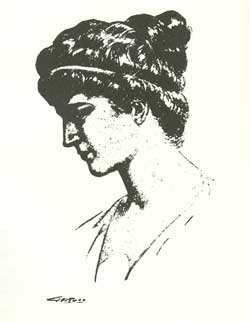Hypatia
of Alexandria was born in AD 370 and was considered for 1500 years to
be the only woman scientist in history. Of course, that was not
accurate, but Hypatia is the earliest woman scientist who is well
documented. Most of her writings have been lost, but many references to
them exist. She died violently at the time of the fall of the Roman
Empire---it would be 1,000 years before there would be significant
advances in science and mathematics while the Dark Ages simmered.
During Hypatia's time,
the intellectual life was endangered as Christian zealots viewed math
and science as evil and heretical. But Hypatia's father, Theon, a
mathematician and astronomer, oversaw his daughter's education. He
strived for her to become "a perfect human being," a remarkable
attitude at a time when women were considered to to be less than human.
Hypatia taught
mathematics, astronomy, philosophy and mechanics; she also taught the
doctines of Plato and Aristotle. Her home was an intellectual center
where scholars gathered to discuss scientific and philosophical
questions.
As politics and
religion increasingly clashed with hostilities, Cyril, Patriarch of
Alexandria, ordered the expulsion of neoplatonists. When Hypatia
refused to convert to Christianity, she was brutally murdered by
fanatical monks. She was 45.
With the spread of
Christianity and religious chaos, interest in astrology and mysticism
replaced scientific investigation. Greek science survived in Byzantium
and flourished in the Arab world. Not until the middle of the
seventeeth century would science be seriously revived in the Western
world.
Source: Hypatia's Heritage by Margaret Alic.




